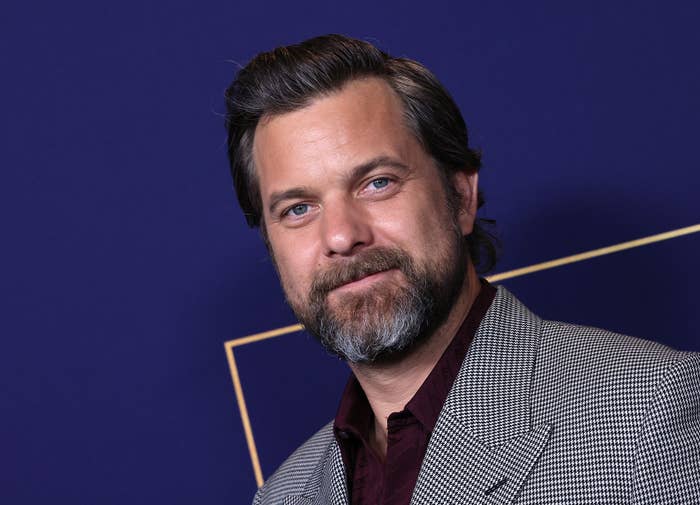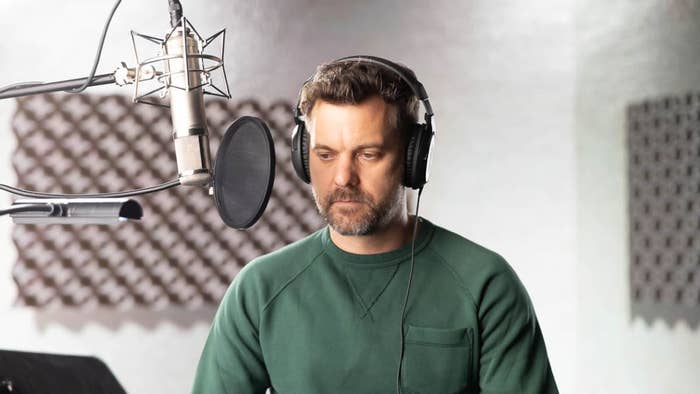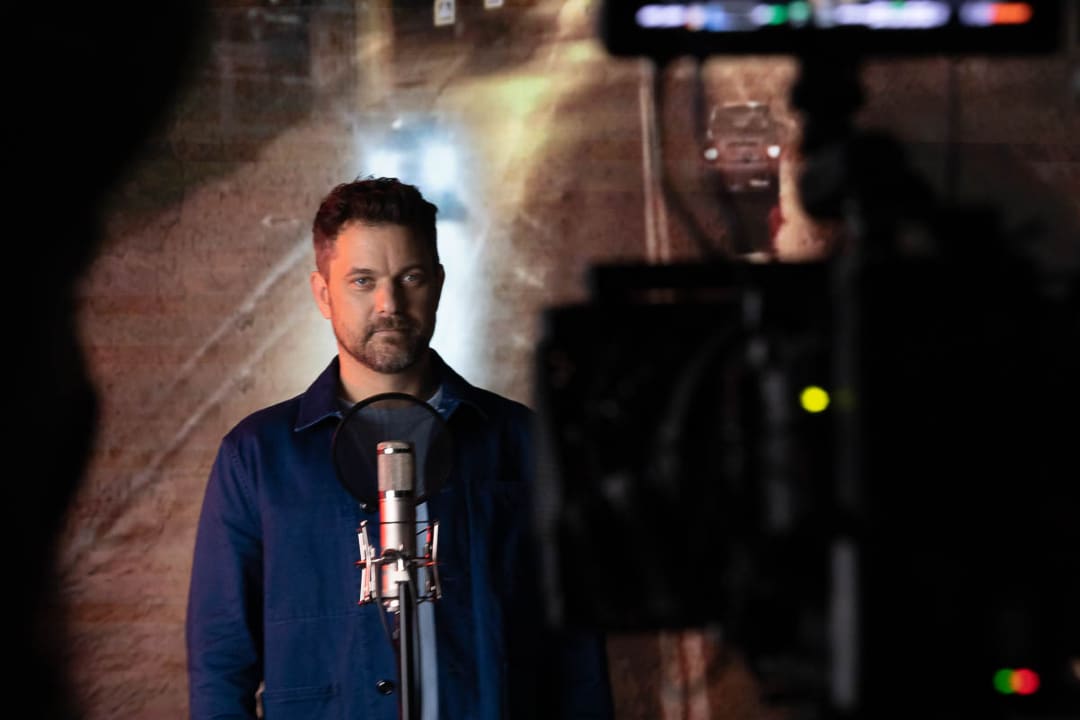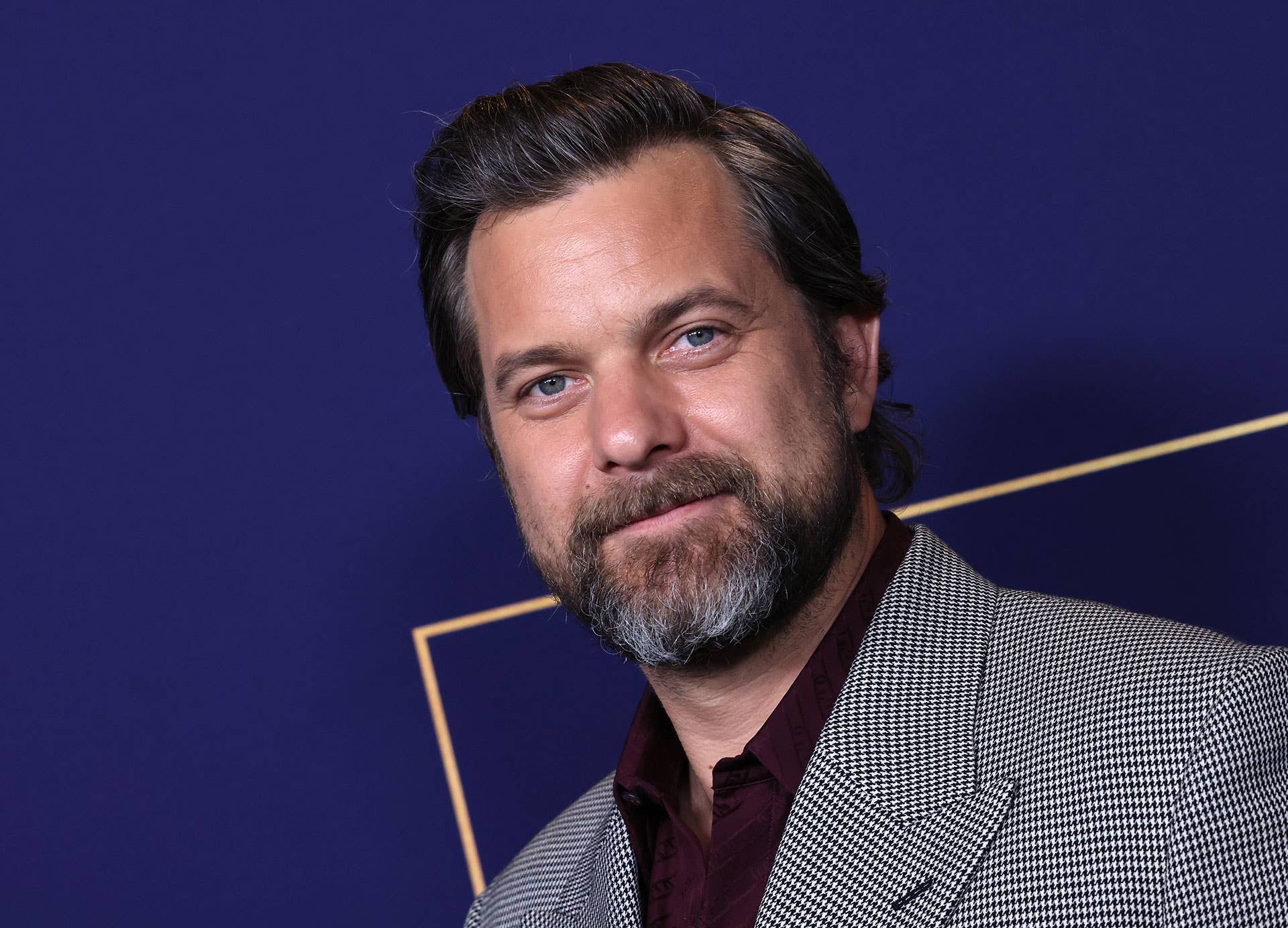
Canadian actor Joshua Jackson rose to fame as a teen heartthrob in the ’90s hit series Dawson’s Creek, right after he landed his first major role on Disney’s The Mighty Ducks. In the last three decades, he’s worked on a span of projects that shows his broad range as an actor. More recently, he’s starred as Dr. Christopher Duntsch on Dr. Death and played roles in When They See Us and Little Fires Everywhere. Now, he returns to voice FBI agent Nate Russo on the Canadian Audible Original Oracle 2: The Dreamland Murders, which is now available on Audible.ca.
The Vancouver-born actor is quite aware that these roles are a far cry from the nice guys on the block: Pacey Whitter and Charlie Conway. While he says these darker roles choose him, the 43-year-old feels compelled when thrillers explore real human conflict and emotions—exactly what he found satisfying about voicing Nate for this podcast. This was the actor’s first foray into audiobooks, and he dove head first to explore a different side to him. Sitting in his home office in Los Angeles, the actor spoke to us via Zoom about Oracle 2, the resurgence of Dawson’s Creek and Mighty Ducks, his chemistry with wife Jodie Turner-Smith, and how much he misses his hometown Vancouver.

First of all, congratulations on the second season of Oracle! I’ll start with the most obvious question because I am a huge horror fan. Do you believe in the supernatural?
I don’t know that I believe in the direct connection like that to the supernatural. But I certainly believe that the universe is way more weird than we give it credit for; that there’s all sorts of things beyond our perception that are happening.
So you’ve never had a supernatural experience per se?
No, I’ve never had a ghost experience. But I’ve had plenty of like, moments of kismet or like, plenty of experiences that feel like they was somehow connected to something broader than me.
Darn, here I was hoping for a ghost story. As a performer, how different is it than acting and voice acting when you’re narrating an audiobook and all you’ve got is the tone of your voice to carry the whole thing? How much do you think about those things when you’re narrating this?
I think about it quite a bit because there are many less tools available to you when you’re doing just audio, right? Oftentimes when you’re on camera, you have to in some part of your brain remember that you don’t need to be sort of screaming, unless you need to be screaming, because everybody’s right here. There’s a lot of visual information coming across with all the other things body language, voice, all the rest. But when you just have your voice, there’s something… there’s some imaginative place that I think is engaged on the audience side, when you don’t have visuals and you just have audio, or even just words, you’re more engaged and your imagination is filling in the space. So there’s this dance that I hope I did, where you’re telling the story, but not crowding out somebody’s thoughts like allowing them to fill in all of the space, which, especially when you’re telling something in the supernatural or something with four elements, you want somebody’s imagination to be engaged, because that’s where it gets scary and creepy and intense.
“I think Charlie has actually had a pretty decent life. I think he probably had, like, a good hockey life, and probably got married and had some kids and moved back to Minneapolis.”
For most actors when they have a project, they have their own sort of preparation, their own sort of research. So for you to faithfully capture the essence of the book, what did you need to do? How did you pull your head to get into that head space?
Well, he put it on the page, right? I started thinking about Nate as a noir character; I love that era and that genre of storytelling. I also think that Nate even though he in some ways an archetype of noir storytelling, he’s a recognizable human being. He has deep flaws, and also a sense of nobility and a sense of duty, and is torn always by this desire to help, but also the pain that that help causes him and the suffering that he’s in, but still recognizing that maybe if I could make some sort of human connection then I could alleviate my own suffering. I think that’s just very real. I think we all go through that to a certain extent.
As a horror fan, I did notice your Jack Nicholson impression from The Shining!
[Laughs.] I mean, I’ve been trying, I’ve been working. If I could have been Jack Nicholson, like my young actor self had a couple of actors that I really wanted to grow up to be and Jack Nicholson was definitely one of them. So I’m happy that I at least got to do the impersonation. [Laughs.]
How long did that take for you to master that?
43 years. [Laughs.] I mean, I’ve been working on it basically my whole life.
I couldn’t help but notice your diversion with crime thrillers—Dr. Death, When They See Us, and Oracle get into that darker space—quite a shift from Pacey and Charlie Conway. Is that intentional?
It’s intentional in as much as the Earth spins around the side. You get older and the stories that you want to tell, but also the stories that are available to you to tell, change. The thing that compels me about any story that I’m going to be working on is, a) that the story is compelling itself or b) it’s something that I recognize that I’m wrestling with myself, right? At the times that I have had the most satisfying work experiences, it’s because of that, because there’s something that I’m grappling with, or I don’t know, that I’m grappling with and need to work it out. That’s what I’m trying to get at with this character. So I feel like now that I’m in the phase of my career where I am, you know, I get to choose the roles that I’m taking rather than the roles that I’m taking choosing me. I didn’t have the intention of getting into crime dramas specifically. But those areas that are dealing with very intense but real human conflict and emotion, those are spaces that I find myself compelled and I want to be in.
“My wife is a pretty beautiful woman. So any chance I have an opportunity to, like, stand beside her being spectacular, I’m going to take that chance.”
And you have Fatal Attraction as well coming up, which is again in that same space.
Yeah, I don’t know why I just… I’ve literally never done a comedy. I’ve been doing this for 30 years. I don’t know why that is. But there’s something clearly trying to work itself out.
I love that your character Nate has psychic powers to solve crimes. Have you ever wanted psychic powers to look into the future? And if so, what would you want to know?
Yeah. Let’s see, what would I want to know?
Maybe when you would get to do a comedy?
[Laughs.] Yeah! I don’t know, I think the burden of actually seeing the future would outweigh the benefit of seeing the future. It’s changed for me now that I’m a father, right? Like, I want to be present in every moment with my daughter, and I would only look with terror at what the future might hold. And we’d rather just be present in the moment with her.
Also, when she’ll start watching all your past performances, including Dawson’s Creek?
Yeah, that’s going to be a long time from now, but it will definitely be… I don’t know, it’ll be a weird moment when she gets to the age when she’s curious about seeing me at that age.

Dawson’s Creek is enjoying a resurgence as viewers rewatched or discovered it on streaming services during the pandemic. How does it feel that it’s being discovered by a whole new generation of viewers?
You know, I’m like pleasantly surprised by this, because I sort of assumed for the connected generation… the social media generation, that they wouldn’t connect to this very specific moment in time. But before these [points to phone], it’s a totally different method of storytelling now. Or human interaction, even where everybody’s on the phone all the time and text messages and Instagram and none of them did the other thing not even Instagram and TikTok. I guess what I missed is that those human emotions are just universal, right? That time in a person’s life. It is immutable. So it translates, I guess, generation to generation. But yeah, it catches me off guard.
It’s a great series, and that’s what makes it such an iconic series back then and even now.
Yeah, except I wish the producers would pay to put the original music back in. I feel like it was a really important part of the storytelling. And I feel like it’s lost something with just generic music.
Agreed. As for Mighty Ducks, is there a possibility of seeing Charlie Conway in Season 2?
No, I won’t be in the second season either.
Where do you think Charlie would be as an adult today?
I think Charlie has actually had a pretty decent life. I think he probably had, like, a good hockey life, and probably got married and had some kids and moved back to Minneapolis. Absolutely. Yeah. I feel like Charlie had a good story.
When it comes to the roles you played, are there any that you feel truly captured an aspect of yourself that you really get to show?
I think every character that I’ve played has some aspect of me. I know that there are actors out there who conceive of characters as a creation totally outside of themselves. But I don’t know how to do that. So the way that I always tried to work is see the pieces that are recognizable, like any human being is way more interesting and complex than any character, in my opinion, any character that’s ever been portrayed. But the places that I relate to a character are aspects, you know, like pieces of the prism, and then you just sort of lean into those aspects of yourself. And that’s what that character is. So I would say, there are pieces of me and every single character that I’ve ever played.
The whole world is obsessed with your partnership with Jodie—you are this iconic power couple. Recently you were at the Met Gala. How do you guys decide which events to go to get together and give the world what they want?
[Laughs.] Well, the last two times we got dressed up together, one was when I was nominated for a Critic’s Choice Award, which was wonderful. It was also the first time we’d had a chance to get dressed up together since the pandemic, so that was quite nice. Then we went to the Met Gala, which was her first Met Gala, and she was very excited about it and she looked fantastic. So the way that we decide is either work tells us or there’s some, I don’t know, we’ve never had a real discussion about planning out opportunities to be well dressed. But my wife is a pretty beautiful woman. So any chance I have an opportunity to, like, stand beside her being spectacular, I’m going to take that chance.
The chemistry is solid when we see you guys on the red carpet. When can we see you two on screen together? A rom-com hopefully?
I don’t know. Yeah, exactly, maybe that’s why I’ve been waiting for all these years—I haven’t done a comedy because I’ve been waiting to do one with my wife. We’ve talked about it. I have my work and she is also quite busy. So we’ll try to do it before I get too old and grey.
We’d love to see that happen! Usually you divide your time between Vancouver and L.A. What do you love about Vancouver?
Because of the pandemic and having an infant, now toddler, I actually haven’t been home in two years, which is the longest stretch I haven’t been home in my life. So we’re going to go this summer. But the thing that I have always loved about being home is that it’s home. It’s all the simple things. So the things that I love about Vancouver are all the simple things, like if we were there right now, the air would smell of cherry blossoms and that particular scent that you get from the ocean and eating a piece of pizza from Nat’s and just, you know, in the feel of that particular sun on your face. It’s just in your DNA, like it’s home. I love it down here and I’ve loved living in New York and I’ve loved living in London and Italy. I’ve had a wonderful life or an opportunity to be in a bunch of different places. But none of those places feel like home, right? Have that organic thing that when you cross the border or step out of the plane, you’re just like, [takes deep breath], I’m here.


